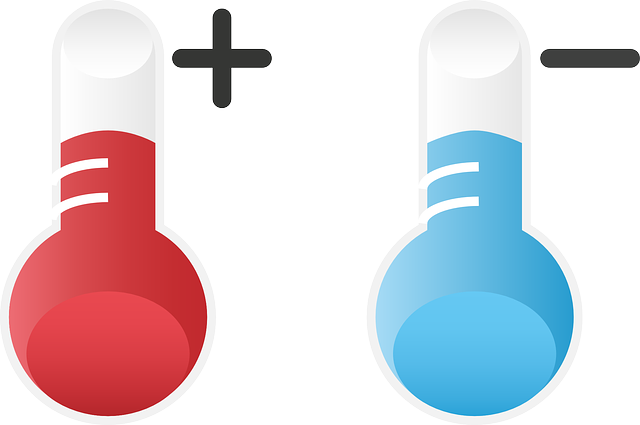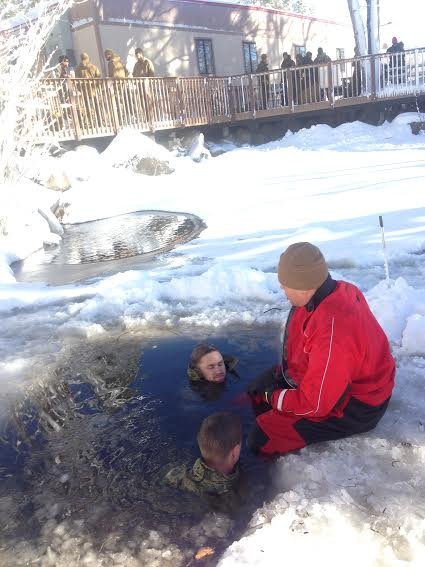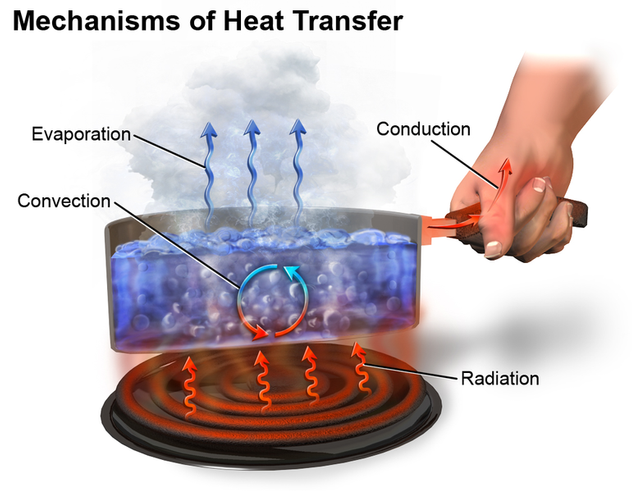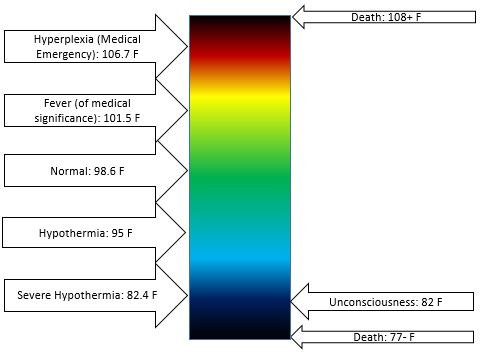Hypothermia; no, you are not iceman.
Hot!
What comes to your mind when you see the word above? I’m sure it’s a lot of things. From the feeling one gets when walking under the scorching sun in Nigeria to the description of a sexually attractive person. It all fits the description but I would stick to the first one I mentioned. Something is hot when the temperature is high right? Yes.
Or not?
On the flip side is the word cold and of course it is used to refer to something whose temperature is lower. Pardon me, I know these terms are not in any way new to you, I intend to use it to drive a point. Either something is hot or cold, it is somewhat relative and unless a reference temperature is stated, one might not know the right one to use for whatever temperature.
What do I mean? Let’s assume someone lives on the sun (I know that’s impossible but let’s just imagine it), the person would consider whatever temperature we are regarding as “hot” on earth as cold. Likewise, someone living in Antarctica would still consider Nigeria’s cold as fairly warm. So the deal is, whatever you consider as hot or cold is relative to the temperature you choose as a reference.
The temperature of a body is dependent on the heat supplied to or generated by the body. Don’t get it twisted, heat is not temperature, it is more of like the energy generated as a result of random motion of particles within a body while temperature is a measure of how hot or cold a body is. Simply put, if we apply heat to a body, its temperature increases. Simple? I guess so.
One beautiful thing about heat is that it can be transferred from one body to the other and this is made possible by the difference in temperature between the two bodies. Something called temperature gradient. Heat moves from a body with higher temperature to that of a lower temperature. Why not lets do a small experiment?

image source: PIXABAY under cc0 license
Take a bottle (or sachet) of cold water and drop it in a bowl containing water at normal temperature. Well, I expect you to know what would happen after some minutes. The water in the bottle would not be as cold as it initially was or it would be hotter than it was (you see, relative). Why? That’s because the heat in the room temperature water (and also the heat in the atmosphere) gradually migrated into the cold water because it is colder and that resulted in the increase in temperature. If the water in the bowl was boiled to a higher temperature before inserting the cold bottle, the cold bottle would be even warmer. That simply explains that heat can move (or be transferred) from one region (of higher temperature) to another (of lower temperature).
The concept we just discussed is called heat transfer and just like the name says, it deals with how heat is transferred from one body to another. Let me briefly talk about the ways by which heat can be transferred.
First off is heat transfer by conduction which simply entails the transfer of heat from one body to another when they are in contact with each other. For example, you touch a hot pot and you feel the heat, the heat got to your hand by conduction. The second mode of heat transfer is by convection which is simply the transfer of heat via a fluid. In this case, the bodies may not be in contact but the fluid in contact with the surface of the hot body receives the heat. Take for instance, boiling water in a pot, the heat from the flame goes to the pot (solid) and then transferred to the water (fluid). Lastly is heat transfer by radiation. This type of heat transfer does not require any medium to carry the heat. A concrete example of heat transfer by radiation is us feeling the heat from the sun.
Have you been wondering what I am trying to say? Please stay a little while and read further.
Have you watched a movie where a military operation is done at night and they would need to locate people? Well in order to do that, they either use night vision goggles or use devices that detect the heat signatures of the people and then boom! They strike. Well, this is not a lie or an illusion, the fact that the human body generates heat is true. The human body (as complex as it is) as a result of the metabolism processes occurring in the body, generates heat and this heat is required for the body to function properly.
Scientists have capped the optimum temperature of the human body to be 37o C (98.6oF). An increase of decrease in this temperature could occur as a result of abnormalities in the body, either due to sickness such as fever and the likes. When this happens, the body system works to regulate the temperature via a series of processes. A process called homeostasis is what the body does constantly to regulate such conditions as body temperature and the likes.
Although the body tries to ensure optimum temperature, a lot of external factors can affect the temperature of the body, a major one being the temperature of the environment. Recall I mentioned the ways by which heat can be transferred from a region of high temperature to that of lower temperature? Well, the concept applies to the human body and the environment. If the temperature of the environment is hotter than that of the body, the heat would be transferred to the body (obeying the law) and the body sometimes responds to this by releasing sweat which should cool off the body by absorbing the heat and evaporating. See, there is always an absorbing and transfer.
On the flip side, if the temperature of the environment is lower than that of the body, the reverse is the case. Yes, heat from the body is transferred to the environment (recall heat moves from region of higher to lower temperature). By wearing thick clothing, we try to trap the heat so as to prevent it from escaping to the environment. But what happens if the body heat goes below the optimum temperature? Let’s take a look.

Some military personnel undergoing hypothermia training. image source: wikimedia commons under the Creative Commons Attribution-Share Alike 4.0 International license.
I was watching a show on discovery family – Ultimate survival. It entails a guy that enters harsh terrains of the World and tries to survive and move to safety all in a bid to show people what to do if they find themselves in such a situation. It is quite an interesting program and I always learn survival tactics from there ( maybe one way I have been able to survive the dip).
On one of the episodes, he was in a place covered with snow and temperatures there were below freezing. He talked about making sure one tries to maintain the body temperature by jogging, keeping dry and wearing thick clothing. If one does not do that and the body temperature drops, one risks the danger of hypothermia.
Hypothermia! That word struck me and I decided to do a little research on it and hence this post.
When the temperature drops
Recall I said the optimum temperature for the body is 37o C. any drop in the temperature below 35o C without attention, one is at risk of HYPOTHERMIA.
Hypothermia is a medical condition that occurs when the body temperature falls below 35o C. you know I said the body produces heat as a result of metabolism, if the temperature of the environment is so low such that the body gets to lose the heat as soon as it generates it, the body temperature drops. Although the body tries so hard to regulate the temperature, if the environment is so cold, there is nothing the body can do about it. Hypothermia occurs in stages and some people react differently or have different tolerance levels for cold temperatures but the indications are quite very similar.
Have you ever been out in the cold for a while and then you begin to shiver? Well that is one indication of hypothermia setting in. as soon as the temperature of the body decreases, the body responds automatically via shivering. Just like running for a distance causes you to feel hot, the shivering movement is aimed towards that – to generate heat to help regulate the temperature.
Other things that happen when one experiences hypothermia include a slurring in speech (yes, I can also relate), weakness of the body and joints, uncoordinated actions, loss of memory, confusion, reduced pulse, loss of consciousness and eventual death (I wonder if death can still be considered as a symptom but lets keep it there)
A further drop in the temperature is not a good thing to happen because the temperature will alter the proper functioning of the organs and if left unattended, might eventually lead to death.
Cold Death in stages
Hypothermia occurs in stages depending on the severity of the heat loss and/or the time of exposure. Stages are categorized into three and I would do well to list them.
When the temperature starts dropping: Mild Hypothermia
Mild in the sense that quite a lot of the symptoms are in the early stage and the body is trying to increase the body temperature via shivering, increase in blood pressure (do you know the relationship between temperature and pressure?), elevated breathing and the likes.
As the name implies, the condition is still mild and can easily be gotten out of. Further decrease in temperature however increases the dangers.Further below the reference temperature: Moderate Hypothermia
Moderate hypothermia occurs as the body temperature plunges deep below the optimum temperature. The body’s response to this also increases and one would experience violent shivering. Visible signs of freezing such as pale lips appear and the body tries harder to keep the temperature right. Other symptoms surface and the person begins to lose control, loss of concentration and impossibility in movement. Well, I wouldn’t be telling you lies if I say that further decrease in the temperature makes the matter worse.Obeying the laws of physics but definitely not how it is desired: Severe Hypothermia
At this point, a lot of things would set in and death is imminent. Some of the metabolic processes in the body come to a halt because the temperatures are not conducive. A stop in shivering and a drop in heart rate coupled with little or no brain activity.
One funny thing about hypothermia is that as it gets sever, the person would be so confused that they would want to pull of their clothing (sounds funny? Its true). After sometime, the person might appear dead and movement is not evident.
Heat increases temperature!
To get out of hypothermia, one would simply need to increase the temperature of the body. If the condition is still mild, using a thick and dry clothing and getting to a warmer environment would help to increase the body temperature. Taking of warm fluid would also help increase the body temperature.
If the person is not responding, contacting the nearest emergency health service is the best thing to do if you are not a medical personnel. Before a person that suffered from hypothermia can be pronounces dead, the body would first be warmed. If after that, the person does not gain consciousness, then it’s the end.
The cause of hypothermia is quite obvious which is the exposure to cold conditions for a long time causing gradual reduction in the body temperature. A case of heat transfer that is not desirable.
CONCLUSION
Hypothermia might not be a new term to some people but to some extent, it is quite new to me. Maybe because of the part of the Earth that I live in. all the same, I feel it is important that we know what it is and how it can be managed.
Another condition similar to hypothermia is frostbite which although is not as deadly, it is not a good one to experience either.
Hypothermia does not occur only in places with snow, anything that can cause the cooling of the body (such as staying in cold water or cold weather for too long) can cause hypothermia and it is advisable one keeps on the lookout for signals. So when next you are planning to go on that mountain climbing, ice sking, ocean swimming or whatever, put in mind that your body needs to be kept at a particular temperature to have things go smoothly and as such, make sure you are geared up for the trip.
Simply put, if you feel your body cooling, warm yourself up!
REFERENCES
Extreme survival
scientists say: hypothermia
heat transfer
heat vs temperature
heat transfer
hypothermia
hypothermia
hypothermia


A really well explained article, bro. Hope u will write about the 'heat stroke' thing too. Thats another example of what excessive heat can do.
Cheers bro!
Haha, i will look into that
Thanks for dropping by
pleasure, bro.
Hello @rharphelle
A great read on hypothermia. However, I read a post sometime ago that hypothermia can be therapeutic and the author went on to demonstrate this claim using a real life scenario. Quite confusing how something everyone knows to cause death can, at the same time, be therapeutic. Here is the link:
http://www.sciencefocus.com/article/human-body/therapeutic-hypothermia-cardiac-arrest
Regards.
@eurogee of @euronation and @steemstem communities
Yeah, i came across that too (not the article but the claim). I wonder how they got to that discovery
Hi @rharphelle!
Your post was upvoted by utopian.io in cooperation with steemstem - supporting knowledge, innovation and technological advancement on the Steem Blockchain.
Contribute to Open Source with utopian.io
Learn how to contribute on our website and join the new open source economy.
Want to chat? Join the Utopian Community on Discord https://discord.gg/h52nFrV
Congratulations @rharphelle! You have completed some achievement on Steemit and have been rewarded with new badge(s) :
Click on the badge to view your Board of Honor.
If you no longer want to receive notifications, reply to this comment with the word
STOPTo support your work, I also upvoted your post!
Cardi B.
Does taking gin or something like vodka help to raise the body temperature?
This is certainly a good read and it's enlightening.
Taking alcohol actually increases the risk of hypothermia because taking it actually increases heat loss.
So taking gin to shrug off cold is a scam 🤔 🤔
Awesome post easily understood. Though I have experienced the aforementioned symptoms. The word hypothermia is new to me as well.
Thank you for dropping by. Im glad i could pass some new knowledge.
Nice write-up from a genius! My first time hearing of hypothermia.
Thanks for reading.
I am honored.
This is awesomely written and quite enlightening. The prior analysis on heat transfer paved way for the better understanding main course.
Kudos!
Im learning from you sir.
C'mon, don't flatter me. Your writing has always been a template for mine.
Nice post mate. I really enjoyed all the punchlines. Hypothermia!hypothermia!!hypothermia!!! Gaffer i have a question. I am this kind of person that sweats and get hot most times under hot weather. When i get home, i don't bath with normal water I will turn to my freezer and pick bottles of iced blocks. Fetch some water in a bucket then dip those blocks in it to make it extremely cold. I bath with the water and feel on top of the world. My main question is can i get hypothermia from constant water bath from ice???
This, when read by a child would understand so easily. You took me back to my college with how you broke down everything related to hypothermia.
BTW, thank God we are have a considerable weather here in Nigeria!
Thanks Doc